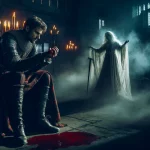Shakespeare’s tragedy, Macbeth, is filled with complex themes and controversial concepts that continue to spark debate among scholars and audiences alike. From the nature of ambition to the definition of masculinity, the play presents a myriad of divisive ideas that leave room for interpretation. In this article, we will delve into three of the most contentious concepts in Macbeth and examine the conflicting viewpoints surrounding them.
The Three Controversial Concepts in Macbeth
One of the most divisive concepts in Macbeth is the idea of ambition. Throughout the play, the protagonist, Macbeth, is driven by his insatiable desire for power and kingship. Some argue that his ambition is a noble trait that propels him to greatness, while others view it as a destructive force that leads to his downfall. The portrayal of ambition in Macbeth raises questions about the nature of human ambition and its consequences.
Another contentious concept in Macbeth is the portrayal of gender roles and masculinity. Lady Macbeth, for instance, challenges traditional gender norms by urging her husband to take action and seize power. This subversion of gender roles has sparked debate about the representation of masculinity in the play, with some critics arguing that Macbeth’s downfall is a result of his inability to conform to societal expectations of masculinity. The exploration of gender in Macbeth reveals the complex interplay between power, ambition, and gender identity.
Analyzing the Divisive Themes in Macbeth
One of the most divisive themes in Macbeth is the nature of evil. The witches, who play a pivotal role in Macbeth’s descent into darkness, embody the concept of evil in the play. Some readers interpret the witches as agents of fate, while others see them as instigators of Macbeth’s moral decay. The ambiguity surrounding the nature of evil in Macbeth raises questions about free will, destiny, and the human capacity for evil.
Another controversial theme in Macbeth is the concept of guilt and conscience. Both Macbeth and Lady Macbeth are plagued by guilt and remorse for their actions, leading to their mental and emotional unraveling. Some critics argue that their guilt is a manifestation of their moral conscience, while others see it as a psychological response to their crimes. The exploration of guilt and conscience in Macbeth highlights the moral complexity of the characters and the consequences of their actions.
Unpacking the Contradictory Ideas in Macbeth
One of the most contradictory ideas in Macbeth is the portrayal of fate versus free will. While the witches’ prophecies seem to dictate Macbeth’s actions, he also makes conscious choices that shape his destiny. This tension between fate and free will raises questions about the extent to which individuals can control their own lives and the role of external forces in shaping their destinies.
Another contradictory idea in Macbeth is the representation of power and authority. Macbeth’s rise to power is characterized by violence and deceit, leading to a corrupt and tyrannical rule. Some readers interpret Macbeth’s actions as a necessary means to achieve power, while others see them as a betrayal of moral integrity. The conflicting views on power and authority in Macbeth underscore the ethical dilemmas faced by those in positions of power and the consequences of unchecked ambition.
In conclusion, Macbeth is a play that continues to provoke thought and discussion due to its controversial concepts and conflicting ideas. Whether it’s the nature of ambition, the portrayal of gender roles, or the exploration of fate and free will, Macbeth challenges audiences to grapple with complex themes and consider the implications of human behavior. By analyzing the divisive concepts in Macbeth, we gain a deeper understanding of the play’s enduring relevance and its exploration of timeless themes.



